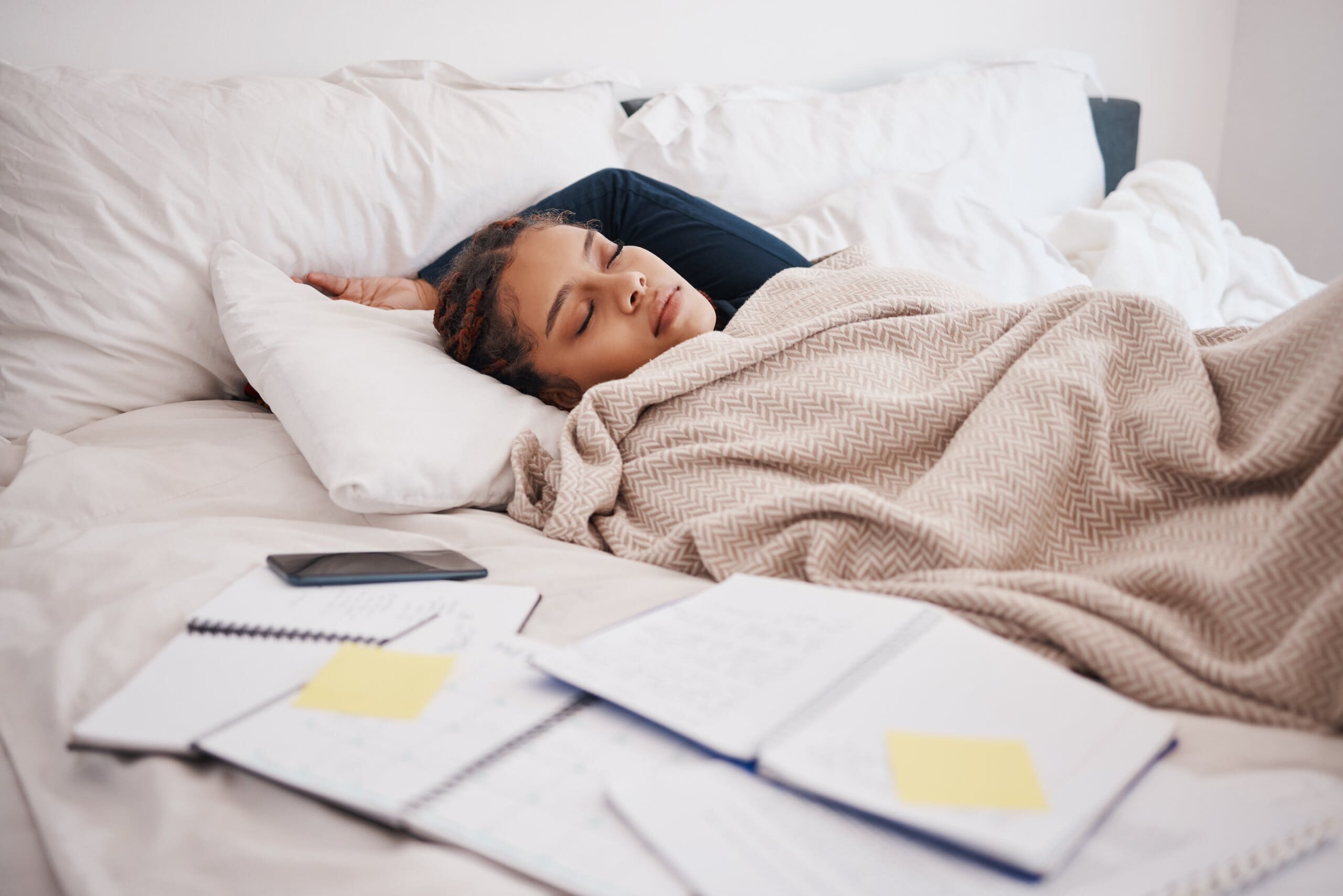Between late-night library sessions, last-minute deadlines, and the occasional flat party that goes into the not-so-early hours of the morning, student life isn’t exactly known for early bedtimes.
But while your calendar might be chaos, your sleep doesn’t have to be. In fact, despite how busy you might feel once you get to university, it’s actually not as difficult as it might sound to put together a sleep schedule that simultaneously lets you party till the wee hours of the morning while also making your lectures on time.
And no, it’s not about giving up your socials or magically becoming a morning person overnight. It’s about finding a rhythm that helps you feel alert, focused, and (mostly) human. At the end of the day, figuring out what works for you is key.
So, let’s get comfy and dive into the best sleep schedule for students.

Why sleep matters: the effects of sleep deprivation on students
Needless to say, the importance of sleep for students can’t be overstated. It boosts memory, focus, creativity, and even your immune system, which is especially handy when half your flat has fresher’s flu.
Sure, you might swap a few hours of shut-eye to revise or hit the bar, but during exam season or high-stress weeks, quality sleep is essential. Your brain needs rest to retain information, stabilise your mood, and help you actually function like a real human.
It’s not just a nice-to-have, it’s your academic superpower!
According to research, students aged 18–25 need at least 7 hours of sleep per night, but plenty of stats show that up to 60% of students regularly fall short of this mark. This means that 60% of students are probably experiencing one or more of the following side effects on any given day:
- Forgetfulness and brain fog
- Mood swings and irritability
- Weakened immunity (hello, missed lectures)
- Lower academic performance
- Reduced concentration and attention span
- Increased stress and anxiety
- Low energy and motivation
- Higher risk of burnout
Basically, sleep deprivation doesn’t just affect your grades, and not getting enough sleep can seriously impact your mental health. Worse still, these effects will only stack up when you’re running on empty. So, if you want to study smarter, feel better, and not crash by midweek, it’s time to build a sleep schedule that actually works – one that fits around Uni life, not against it.
Building a sleep schedule for students that works
Okay, time to ditch the chaos and build the best sleep schedule for students like you. One that supports both study marathons and late-night pub quizzes. And in case you were wondering if 4 hours of sleep is enough for students – it’s really not. You don’t need to overhaul your entire life, just implement a bit of consistency and a bedtime routine that doesn’t involve 3am doom scrolls.
1. Set a fixed wake up time
The secret to a solid sleep schedule? Getting up at the same time every day, even when your first lecture isn’t until lunchtime. Consistent wake-up times keep your body clock in sync and help you fall asleep more easily at night.
Try setting a realistic wake-up time that works across your week, even on weekends (we know, we’re sorry). Sure, the temptation to lie in is real, but try to limit these to no more than an hour. Doing so will help you feel more energised, more clear-headed, and less like you’re rebooting every Monday.
And if you’re not a morning person? Put your phone alarm across the room so you have to physically get up to turn it off – it’s a small trick with a big payoff.
2. Always aim for at least 7 hours of sleep
No matter how busy your timetable gets, 7–9 hours of sleep each night should be your baseline, not a luxury. This is the sweet spot where your brain does its best memory processing, mood regulation, and energy restoration. Anything less, and you’re likely to feel groggy, forgetful, and one flat white away from a meltdown.
At the end of the day, prioritising at least 7 hours helps you stay sharp, focused, and ready to tackle whatever University throws at you.
3. Create a wind-down routine
It goes without saying but your brain can’t go from high-speed revision mode to lights out in five minutes; it needs a wind-down window. And building a consistent bedtime routine helps signal to your body that sleeps on the way.
Start your routine around 30–60 minutes before bed and stick to it each night. The more you repeat it, the more your brain links those actions with getting sleepy. And don’t fight it when your body naturally starts sending “I’m tired” signals. If you feel yourself yawning and slowing down, lean into it.
Pushing past that window can lead to a second wind that’ll keep you up way longer than planned. Treat your wind-down like a ritual – minus the chanting.

4. Gradually adjust your sleep times
If your current sleep schedule is more night owl than early bird, don’t try to overhaul it overnight. Shift your bedtime by 15–30 minutes earlier each night until you land on a routine that works. The same goes for your morning wake-up time.
This gentle approach gives your internal clock time to adjust without the pain of a sudden 7am alarm. Whether you’re aiming to feel more human when you wake up or just want to stop falling into late-night social media rabbit holes, small steps lead to better sleep and better mornings.
5. Rise and shine with natural light
Exposure to natural light in the morning helps reset your internal body clock, aka your circadian rhythm, making it easier to fall asleep (and wake up) at the right times, even after a late night in the library or at the Students' Union.
Open your curtains, or better yet try to get outside within the first hour of waking up. Grab a coffee in the sunshine or walk to class. Just 15–30 minutes of daylight in the early part of the day can boost alertness, and mood, and help lock in a consistent sleep schedule. Think of it as nature’s way of hitting the reset button – no caffeine required.
Top tips: The do’s and don’ts of sleep for students
Now that you’re ready to build your routine, let’s make sure you don’t accidentally sabotage it by lining out the do’s and don’t you should be following to make sure you stick to your new sleep plan as best you can:
Do make your bed a sleep-only zone
In an ideal world, your bed should be for sleep and sleep alone, not for bingeing, scrolling, or doing coursework half-buried in pillows. Training your brain to associate your bed with rest helps you fall asleep faster and sleep more deeply.
Simply put, if you're always lounging there, it blurs the line between relaxation and distraction. That being said, duvet days are totally allowed (we all need them sometimes!). Just try to keep bed rotting to a minimum and regular lounging to other parts of your room.
Protect your sleep space, and it’ll pay you back in better rest.
Don’t cram all night, every night
Pulling an all-nighter might feel productive, but it’s a one-way ticket to brain fog. Skipping sleep to study makes it harder to focus, retain information, and manage stress, especially when exam anxiety is already sky-high. And a consistent sleep schedule is a far better strategy for boosting memory, focus, and staying calm under pressure.
Studies show that even one night without proper sleep can mess with memory formation and cognitive performance. And when stress levels spike, your body produces more cortisol. In really high doses, cortisol can make quality sleep even harder to come by.
So, instead of cramming until 3am, break your revision into shorter chunks during the day and wind down properly at night. Your brain processes and stores information while you sleep, so rest is part of the plan, not a distraction from it.

Do stick to a consistent routine
Whatever your schedule, the golden rule is consistency. Your body loves routine, even if your calendar doesn’t. Going to bed and waking up at the same time every day helps regulate your internal clock and makes drifting off much easier.
Try setting a regular wake-up alarm and a gentle reminder for bedtime to keep things on track. The more consistent you are, the easier mornings will feel and the more in sync you’ll be with your day from the moment you wake up.
Don’t rely on caffeine
When you’re running on low sleep, it’s tempting to reach for endless coffees, but caffeine can linger in your system for hours, making it harder to fall asleep later. That’s why we recommend cutting off caffeine after 2pm (or 6-8 hours before bed) to avoid sabotaging your bedtime.
Instead, a short walk or a splash of cold water during the day can wake you up fast without messing with your sleep cycle. And at night, stay hydrated with water or switch to a soothing herbal tea like chamomile or peppermint – save the espresso shots for exam mornings, rather than late-night study guilt.
Do set the scene for sleep
Creating the right environment for sleep can make all the difference in how well-rested you feel. If you can, keep your room cool (around 16-18°C), dark, and quiet to help your body relax into sleep mode.
We’d also suggest using blackout curtains or an eye mask to block out light and try earplugs or white noise if sound is an issue. Even small things, like clearing clutter or switching off glowing standby lights can make your space feel calmer and more sleep-ready. A peaceful, well-prepped room tells your brain it’s time to switch off and wind down.
Don’t use your phone in bed
Studies have shown that blue light from phones and other devices interferes with melatonin production, the hormone that helps you fall asleep, making late-night scrolling one of the biggest bedtime blockers. Instead, swapping screen time for calming rituals can help your brain wind down naturally and improve sleep quality.
Plus, fewer screens before bed means fewer 3am impulse buys you’ll regret later. We’d suggest aiming to switch off all digital devices at least 30–60 minutes before bed to minimise what impact they have on your sleep.
Do unwind with breathing and mindfulness
Establishing calming bedtime rituals like deep breathing, journaling, or meditation can make it much easier to fall and stay asleep. These small habits signal to your brain it’s time to slow down, creating the perfect wind-down window before bed.
Try simple breathing exercises like the 4-7-8 technique (inhale for 4 seconds, hold for 7, exhale for 8), or a body scan meditation, where you mentally relax each part of your body, from toes to forehead. Research shows that mindfulness-based practices reduce stress, calm the nervous system, and improve overall sleep quality.
And if racing thoughts are always an issue, why not keep a notebook by your bed for “brain dumps” (aka tomorrow’s to-dos and random overthinking) to clear your mind before lights out?

Don’t duvet-dive into despair if you’re still awake
Lying there wide-eyed at 2am, overthinking that seminar you definitely should’ve started earlier? Don’t panic. And whatever you do, don’t try to force sleep, as this will only make it harder to come by.
To avoid associating your bed with frustration, get up if you haven’t fallen asleep after 20 minutes. Do something low stimulus like reading a book (preferably a non-thriller), stretching gently, or listening to calming music. Avoid screens, bright lights, and snacks. Your body needs to stay in snooze mode, not party mode.
Trust that your body knows what it’s doing, when it’s ready to sleep, it will. You just need to give it the right conditions to do so.
Do build your sleep routine around your class hours
Choosing your timetable isn’t just about dodging 9ams, it’s about designing a sleep-friendly routine that actually sticks. If you’ve got a 9am lecture, aim to wake up by 7am. This gives you enough time to get ready, have breakfast, and ease into the day (without sprinting out the door half-dressed and caffeine-deprived).
Not sure when to hit the hay? Think back to a morning you woke up feeling fully rested. Count backwards from that wake-up time to see how many hours of sleep you got. That’s your sweet spot!
Use it to build a bedtime that works around your class schedule, even if it means winding down while your flatmates are still debating what takeaway to order.
Don’t let happy hour hijack bedtime
We get it, alcohol is part of student life. Whether it’s socials, pre-drinks, or celebrating surviving group work, the occasional tipple is totally normal. But when that nightcap becomes your go-to sleep aid? That’s when it gets messy; literally, and sleep-wise.
Sure, a drink or two might help you nod off faster, but that’s just the sedative effect of alcohol. It helps you fall asleep, not stay asleep. As your body metabolises it, your sleep becomes more fragmented, REM cycles get disrupted, and you’re more likely to wake up feeling more zombie than zen.
You don’t need to swear off socials altogether, just limit your intake. Try to stop drinking a few hours before bed and chase each drink with water to help your body process it. Your brain, your pillow, and your early morning seminar will all thank you.
Do move your body daily
Whether you're powerwalking to lectures, hitting the gym, or throwing shapes at the SU bar, daily movement can make a huge difference to your sleep quality. It helps regulate your circadian rhythm, reduces stress, and makes it easier to fall asleep and stay there.
Save the high-intensity workouts for the morning or afternoon when they’ll energise you and help sync your body clock. In the evening, it’s best to keep things chill. Intense exercise too close to bedtime can delay sleep by raising your heart rate, body temperature, and adrenaline levels. Try gentle yoga or stretching at night to signal it’s time to wind down.
And even if you’re new to exercise, there’s no need to go full gym rat. Just a 20-minute stroll between lectures or a light stretch before bed can do the trick.
Don’t overdo your power naps
We get it, sometimes you hit that 3pm slump so hard, and even your coffee needs a coffee. While avoiding naps is ideal for keeping your sleep schedule on track, sometimes a quick kip is the only thing standing between you and functioning like a human for the rest of the day.
If you do need to nap, keep it short and sweet, aim for 20–30 minutes, max. Any longer and you risk waking up groggy and disoriented. Avoid napping too late in the day, too. It can mess with your bedtime and turn that “power nap” into a full-blown sleep saboteur.

Do upgrade your sleep environment
Let’s be honest: your sleep space matters. A lot. It’s much easier to stick to a sleep schedule when your mattress doesn’t feel like a lumpy punishment and your bed frame doesn’t sound like it’s haunted. Upgrading your sleep environment can seriously level up your nightly rest and help train your brain to recognise when it’s time to wind down, which is key to maintaining a regular sleep-wake cycle.
This is where MattressNextDay comes in to save your snooze. We’ve got comfy, supportive mattresses to suit every budget, perfect for students who want to sleep like royalty without spending like one.
Our sturdy bed frames are easy to set up, look sharp in any dorm or flat, and won’t wake the neighbours every time you turn over. With the right bedstead, you’ll fall asleep faster and wake up feeling like a functioning human (yes, even before your 9am).
Or, if you're in rented accommodation like most students and can't change up the furniture too much, opt for a mattress topper to seriously upgrade an old lumpy mattress. With memory foam and natural material options, there are plenty of ways you can turn your bed around and start getting a better night's sleep.
So, whether you’re upgrading from the floor (we won’t judge) or just levelling up your lie-down, your dream sleep setup starts here, and we’ve got everything you need to get your student sleep schedule back on track.






